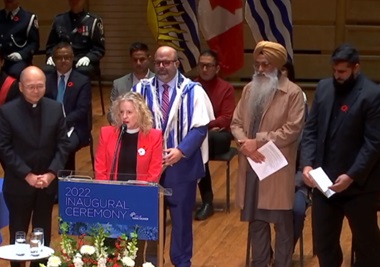
Apparently we won’t be seeing this again in Vancouver. Mayor Ken Sim invited five religious leaders to pray at the City Council inaugural ceremony in 2022. From left: Deacon Richard Chau (Catholic), Rev. Beth Hayward (United), Rabbi Dan Moskovitz, Head Granthi Harminder Pal Singh (Khalsa Diwan) and Tariq Tyab (Al-Masjid Al-Jamia).
The BC Humanist Association (BCHA) reported June 3 that you can indeed beat city hall, even without prayer.
BCHA Executive Director Ian Bushfield said, “We’re feeling vindicated today that the City of Vancouver recognized the issue we and others had with the prayers delivered at its inaugural meeting.”
Mayor Ken Sim had invited five religious leaders to pray at the City Council inaugural ceremony in 2022.
The BCHA release stated:
The City of Vancouver has said that prayers at its most recent inauguration ceremony were “a breach of the duty of religious neutrality.”
A lawyer for the City made the concession in response to the threat of legal action from the BC Humanist Association (BCHA).
In light of the City’s acknowledgement, the BCHA has dropped its planned lawsuit and will closely follow the plans for the next inaugural ceremony.
The City of Vancouver emailed the BCHA, acknowledging “a breach of the duty of religious neutrality” (May 31) and assuring the BCHA that the city “will comply with its constitutional obligations as set out in Saguenay and subsequent decisions” (May 15).
The BC Humanist Association has relied heavily on the Supreme Court of Canada’s Saguenay decision (2015), which ruled that prayers at municipal council meetings are unconstitutional as they breach the state’s duty of religious neutrality. The BCHA pointed out that although five religious leaders were invited, the ceremony did not include other religions or non-religious leaders.
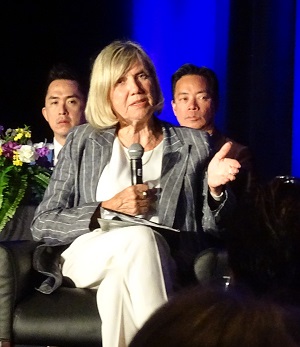
Kathleen Mahoney spoke at the BC Leadership Prayer Breakfast last year. Mayor Ken Sim (right) participated as well.
Kathleen Mahoney, human rights lawyer and Professor Emerita of the Faculty of Law at the University of Calgary, wrote about the Saguenay case, which “seems to have closed all the doors to future prospects of religious faith playing a role in the public square.”
She noted that “Calgary’s [then] mayor Naheed Nenshi disagrees, saying that there is room in the public square for faith, and that Calgary City Hall will explore ways of getting around the ruling.”
She didn’t hold out much hope for Nenshi’s project, though, stating:
Expanding on the necessity for neutral public spaces, the Court says dignity, multiculturalism and diversity (at para 74) are also preserved.
In a rare move, the Court invoked the multiculturalism section of the Canadian Charter, saying section 27 requires that the state’s duty of neutrality be interpreted not only in a manner consistent with the protective objectives of the Charter, but also with a view to promoting and enhancing diversity.
Section 27 recognizes that Canada is not the purely Christian nation it once was. While the Christian faith may be part of Canada’s or Quebec’s culture and heritage, governments cannot hide behind history to promote religious views (at paras 78, 118).
The Court rejected the argument that by taking religion out of public spaces the Court favours non-believers. It pointed out that it would be equally offensive if municipal officials were to make a solemn declaration that its proceedings were based on a denial of God. The state neutrality principle would render such an invocation unconstitutional because it would exclude those who believe in a God (at para 133).
Finding that prayers in the public square violate equality rights of non-believers further bolstered the Supreme Court’s ruling (at paras 116, 127). When government officials legitimize prayers as part of official functions, they discriminate against non-believers’ fundamental rights to equally participate in the democratic process (at paras 75, 120, 127).
Nenshi’s argument that a nondenominational prayer would suffice, fails to address exclusion. Any kind of prayer amounts to making City Hall a preferential space for people with religious beliefs.
Go here for the full comment.
(I wrote about Mahoney’s talk at the BC Leadership Prayer Breakfast last year, when she stepped in at the last moment for the keynote speaker, former Chief of the Assembly of First Nations Phil Fontaine – her husband, suddenly taken ill.)
Although the Evangelical Fellowship of Canada and Catholic Civil Rights League intervened on behalf of the City of Saguenay, it does not appear that there is much of a groundswell among Christian (or other religious) groups in favour of prayer at city council meetings.
The BCHA has been working hard to end all public prayer in municipalities, and at the provincial legislature in Victoria. Go here for links to their many articles pursuing the issue.
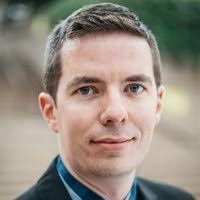
Ian Bushfield
And they have several other goals in mind. Writing at the end of 2023, Bushfield said:
Building off that success, we will turn our attention to property tax exemptions. Specifically, we’re developing model policies that we will be asking cities to adopt to ensure those exemptions are reserved for organizations that deliver real public benefits.
We are also going to survey the policies of public school boards across the province. From this, we will be able to identify best practices to protect the secular nature of our schools, as well as to ensure every district has policies that promote the inclusion and diversity of the entire community.
We also have to keep up the pressure to end institutional objections to providing reproductive and end-of-life healthcare options to patients in publicly funded facilities.
And we need to stay responsive to church-state separation issues as they arise.
The BCHA lists its main areas of focus here.
Effect of UNDRIP
The same day as the BC Humanists’ report, the City of Vancouver and local First Nations released a five-year plan to implement UNDRIP (United Nations Declaration on the Rights of Indigenous Peoples) locally.
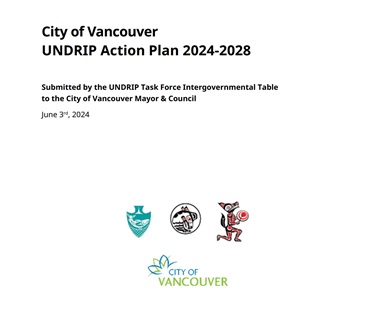 A June 3 CBC News report stated:
A June 3 CBC News report stated:
The United Nations adopted UNDRIP in September 2007, providing a framework for reconciliation, including actions to respect, acknowledge and protect the rights of Indigenous people worldwide.
While Canada initially opposed the declaration, the federal and provincial governments have since passed legislation to implement UNDRIP.
The City of Vancouver created a task force in 2021 to examine how UNDRIP could be implemented on a municipal level, and the following year, it released its UNDRIP strategy.
On Monday, the city released its report, which includes 18 goals for the city, xʷməθkʷəy̓əm (Musqueam Indian Band), Sḵwx̱wú7mesh (Squamish Nation), and səlilwətaɬ (Tsleil-Waututh Nation), to work toward over the next five years.
Go here for the full article.
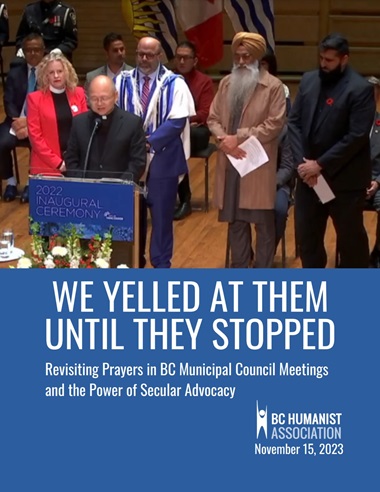 It will be interesting to see whether the BCHA (and local city councils) determine that the ban on prayers extends to Indigenous prayers.
It will be interesting to see whether the BCHA (and local city councils) determine that the ban on prayers extends to Indigenous prayers.
A colourfully-titled BCHA report – ‘We yelled at them until they stopped: revisiting prayers in BC municipal council meetings and the power of secular advocacy’ – isn’t entirely clear.
In the abstract they note:
[T]he number of inaugural meetings that included Indigenous content, such as a greeting from an elder, traditional welcome or territorial acknowledgement, doubled from 38.8% (50 of 129) of meetings in 2018 to 71.6% (106 of 148) in 2022. Secularists must continue their efforts to ensure every municipal council is inclusive and welcoming of their entire community.
The 66-page report – “the fourth in a series of reports from the BC Humanist Association that explore compliance with the Saguenay decision” – devotes two pages to ‘Indigenous content.’
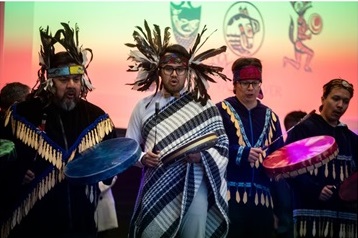
Indigenous drummers during the City of Vancouver UNDRIP Action Plan unveiling June 3. CBC News photo
The authors seem keen to make room for Indigenous prayer-like initiatives, especially if they are not too Christian:
The lines between religion, spirituality and culture are blurry, especially for practices that differ from Christianity. If a pastor stands before a council meeting and offers a prayer in Jesus’ name, we quickly identify this as a prayer.
Categorizing the myriad of Indigenous content that we encountered as ‘religious’ or ‘spiritual,’ on the other hand, is problematic and inaccurate. It would result in the omission of Indigenous content that lacked elements classified as conventionally religious, such as artistic, cultural and diplomatic practices. . . .
A deeper exploration of this concept and other ways of decolonizing municipal politics in BC and Canada is a topic of further research. Suffice it to say that Indigenous content cannot and should not be treated in the same category as religious prayer, the type that Saguenay proscribes.

Here is my response. https://substack.com/home/post/p-145417813?source=queue
It seems that the humanists fear the power of prayer. Why else go to the trouble of launching a lawsuit?
What can we do for our beloved humanist friends but pray for them?
Do pray for us . . . spend as much time as you can on it. Because while you’re wasting time doing that, you aren’t doing the other more tangible harmful things that religion has done to society over the centuries. Shame you can’t recognize how important it is for city councils to fairly represent all citizens by being secular.
Maybe if you want to be more productive, you could go out and help search for the graves of kids forced to attend abusive christian residential schools – forced to attend by governments that were controlled by your religion and that didn’t respect different beliefs.
A sad day indeed. In regards to the BCHA wanting to ensure property tax exemptions “are reserved for organizations that deliver real public benefits,” this is further proof the mainstream world has little clue of the spiritual and practical good churches provide both to their members and the community around them.
Every last bit of the practical good churches provide could be accomplished just as well, if not better without wrapping it up inside your irrational belief in an imaginary friend in the sky. There’s a long history of the good charity work of various churches being withheld from people in need who don’t live the way the church wants them to live, or by first making them swallow an indoctrination session in order to get desperately needed help.
You have to give the humanists credit. They do a better job of evangelizing their faith than many of us do ours.
I don’t see any reason why a council couldn’t welcome anyone who wants to offer a prayer before the meeting starts. Let the praying be done in an unofficial capacity.
If you don’t see any reason . . . then you didn’t read the article. City councils must be secular in order to fairly represent the population. Prayer before a meeting shows that the council is biased or influenced by religion. And we’ve had enough centuries of that kind of influence truly harming people that the church didn’t approve of.
Put away the privilege your church has had over society forever, and deal with merely being equal to everyone else. You can chant your magic spells all you want on your own time, at your church, in your home.